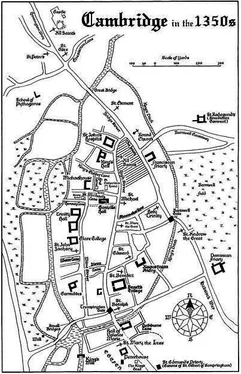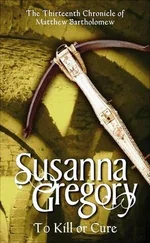The following morning, Bartholomew sat in William’s room, explaining to the bemused Franciscan Thomas Bradwardine’s theory about the relationship between moving power and resistance. It was a difficult text, full of mathematical statements and axioms, all leading to calculations showing the variations in velocity that occurred when the original ratios of moving force and resistance were less than, more than or equal to the proportio dupla , which was two-to-one. Despite its complexity, the physician regarded it as exciting scholarship, and tried hard to simplify it for William, so they could debate it together.
‘Heresy,’ muttered William darkly, before Bartholomew had reached the end of his analysis of the second of Bradwardine’s twelve conclusions. ‘You do not need to know ratios in order to apply force or resist something.’
‘That is not the point,’ said Bartholomew, frustrated. ‘Bradwardine is explaining moving power and resistance in mathematical terms – to define them as universal laws.’
‘Only God makes universal laws,’ said William firmly. ‘It is not for men from Oxford to try to do it.’ So much contempt dripped from his voice when the name of the Other University was mentioned that Bartholomew decided he had better find someone else to debate with. His eyes lit up when there was a perfunctory knock at the door and Michael entered.
‘Good,’ he said, pleased. The monk had a sharp mind, and was easily the best Fellow to engage in a discussion about natural philosophy. The others tended to dismiss physics and mathematics as secular – and therefore inferior – subjects. ‘Let me read you Bradwardine’s refutation of Aristotle’s theorem pertaining to the second opinion–’
‘When will Matthew’s own room be available?’ interrupted William rudely. ‘I do not think I can take much more of this velocity business. I should have offered him a copy of Thomas Sutton’s De pluralitate formarum instead. That is a religious commentary, and would have kept him away from all this nonsense involving resistance.’
‘You gave him a book?’ asked Michael suspiciously. ‘Why did you do that?’
William blanched, rubbing the still-splinted leg in agitation. He began to prevaricate, clearing his throat and coughing, while he tried to invent a reason for the gift that Michael would accept. He certainly did not want the Senior Proctor to know he had been malingering.
‘It was payment for treating his leg,’ replied Bartholomew truthfully, although he was aware that Michael knew perfectly well William’s injury was not as serious as he claimed. ‘And for keeping certain personal details confidential.’
‘What kind of details?’ demanded Michael immediately.
Bartholomew laughed. ‘This is an excellent book, and I do not want to give it back by betraying William’s medical history. Anyway, his injury is none of your affair. Leave him alone.’
‘Thank you, Matthew,’ said William, relieved. ‘But I still mean what I said about Bradwardine. The next time I require your confidential services, you will be getting Sutton.’
‘Look at this, Matt,’ said Michael, proffering a piece of parchment.
‘It is the list of loans made by Dympna since its origins during the plague,’ said Bartholomew, glancing at it. His eyes strayed back to the much more tempting words of Bradwardine. ‘I saw it yesterday, when Frith had us trapped in the conclave.’
‘I have been going over it with Kenyngham,’ said Michael. ‘Ailred made loans totalling almost ten pounds over the last few weeks. Some money has been repaid, but most has not. Norbert was lent three pounds, eight shillings and fourpence, which was the amount mentioned on the note we found inside Gosslinge. Meanwhile one pound, thirteen shillings and fourpence, the amount on the note Quenhyth found in Frith’s belongings, was demanded from him the day he died.’
‘So, you were right about the “missing hour” in Norbert’s last night,’ said William. ‘He left Ovyng and went to St Michael’s to meet Dympna, who was actually Frith. It was only after that he went to the King’s Head, where he stayed for the rest of the evening.’
‘He left the tavern at midnight and was stabbed on the way home,’ said Michael. ‘By Frith, I imagine, because he failed to bring money for Dympna, yet promptly went to a tavern and bought ale and a woman. But Norbert’s is not the only name next to an amount that is outstanding.’
Michael looked pleased with himself, and the physician knew why. ‘Harysone’s is there.’
Michael was crestfallen. ‘How did you know that?’
‘I noticed it yesterday. You must be happy: you have been looking for an opportunity like this ever since he arrived.’
‘It is enough for me to expel him from the town if he refuses to pay. I am going to see him now, in the King’s Head. Come with me.’
‘No, thank you,’ said Bartholomew. ‘I do not want to help you victimise a man who has done nothing but borrow money. You had him marked down as involved in the deaths of Gosslinge, Norbert and Turke at various stages of the investigation, and you were wrong.’
‘He borrowed two pounds, thirteen shillings and fourpence.’ Michael grinned with delight. ‘And that is what he must pay me today, or he can leave my town. I do not want debtors here: we have enough of our own.’
‘But if you send him away, Dympna will never be repaid.’
Michael sat on the windowsill and folded his arms. ‘You think I am unreasonable, but I do not trust that man. He has done nothing illegal – at least, nothing that I know about – but it is only a matter of time before he does. I want him gone. Trust me, Matt. I am not often wrong about these things.’
‘Very well,’ said Bartholomew, rising reluctantly and placing his new book on a shelf. He glared at William. ‘Your splint can come off soon, and then you can trail around after the Senior Proctor like a performing bear.’
‘Tomorrow,’ said William. He cast a disparaging look at the Bradwardine. ‘I would rather be evicting pardoners from taverns than listening to theories about things that push and pull, anyway.’
‘Do not hurry on my account,’ muttered Michael to Bartholomew as they started to walk to the High Street, Bartholomew still fastening the clasp on his cloak. ‘It has been a pleasant relief to be rid of him for a while, although my fines chest is not what it was. You can let him malinger a little longer, so he has his money’s worth for the book he gave you. You are as bad as Morice – prepared to sell your soul for material goods. But speak of the Devil and he will appear.’
Sheriff Morice was riding along the High Street on his handsome grey horse. His saddle gleamed expensively, and his fur-lined cloak was thick and heavy. His lieutenants flanked him, gaudy, fluttering hens around a strutting peacock. Morice was in the very centre of the road, where he was least likely to be deluged by the snow that still dropped from roofs. He rode carelessly, making no attempt to steer around other folk, and anyone who did not move was casually trampled.
‘I have just seen some students in the King’s Head,’ he announced to Michael, reining in and gazing with brazen disdain at the monk. ‘I ordered them out, but they informed me I had no jurisdiction over them. I want them imprisoned and fined for insolence.’
‘What are their names?’ asked Michael coolly.
‘I did not bother to find out,’ said Morice nastily. ‘I have better things to do than engage in conversation with a group of ill-mannered louts who think a Franciscan habit gives them leave to insult the Sheriff.’
‘I am on my way to the King’s Head now,’ said Michael, patting Morice’s elegantly clad leg patronisingly. ‘Do not worry; I will show them who is master. But what were you doing in such a disreputable institution? I hear there are some illegal gambling games scheduled in the King’s Head this week. Were you planning to take part?’
Читать дальше












